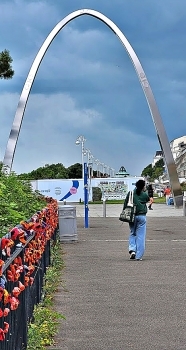Down the slope to an uncertain fate in France and Flanders
A PARABOLIC ARCHWAY made of stainless-steel straddles a pedestrianised roadway on the clifftop near to the harbour in Folkestone (Kent). A few yards east of the archway, the road descends steeply towards the harbour and a pier from which ships used to sail to and from Fance. The impressive metal hoop was inaugurated in 2014 by Prince ‘Harry’, son of King Charles III. It commemorates the one hundredth anniversary of the start of WW1. The roadway that runs along the clifftop and then down to the harbour is now known as Road of Remembrance. On a fence close to the archway, there are thousands of crocheted poppies, lovingly made by women mourning the tragedy of the so-called Great war.

It was along this road and down the slope, formerly known as Slope Road, that during the Great War (1914-1918) millions of soldiers and auxiliary staff marched from nearby Shorncliffe Camp to the harbour, where they embarked on ships that carried them across the English Channel to war-torn France. As a BBC website page (www.bbc.co.uk/news/uk-england-22892729) related in connection with the roadway:
“For many of the millions of servicemen making their way to the trenches of World War I it was the last part of Britain they stepped foot on.”
The archway, which is close to the steep slope is called the Step Short Memorial Arch because as the website explained, “Step Short” was:
“… the order given to the marching men to shorten their stride as they went downhill.”
When we visited Folkestone in July 2025, we were able to walk beneath the arch, see the poppies, and read the various emotional commemorative information panels near it. However, the sloping part of the road leading down to the harbour was closed off for repairs. The banks lining the slope had begun to subside making it hazardous to be on this historic stretch of road.
I was very much moved by the Road of Remembrance, the archway, and the various memorials. For many of those who marched down that steep slope, it would be the last time they would ever see England. For, as is recounted in a British Parliamentary website (www.parliament.uk/business/publicatio...), during WW1:
“… 880,000 British forces died, 6% of the adult male population and 12.5% of those serving.”
That means that about one out of every eight men walking along where the arch now stands and then down the slope would die across the Channel in France or Flanders.
The pointlessness of war.



